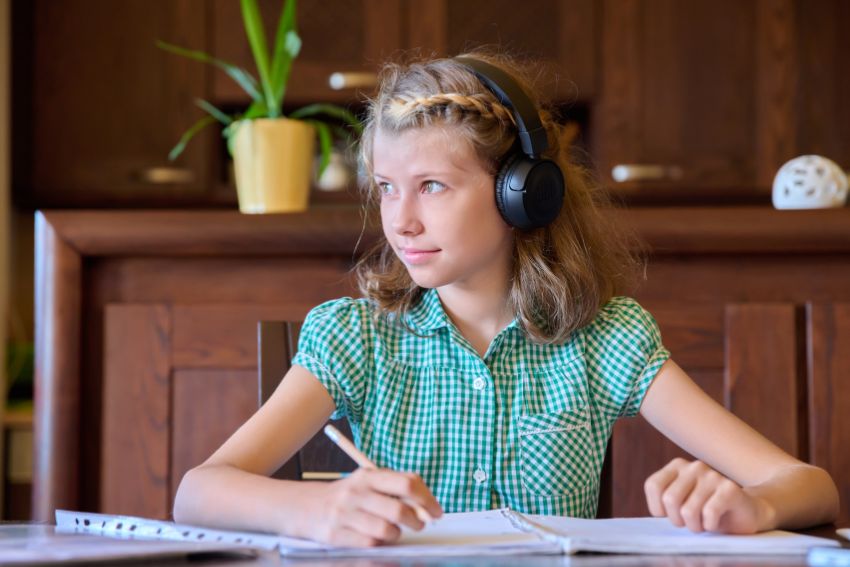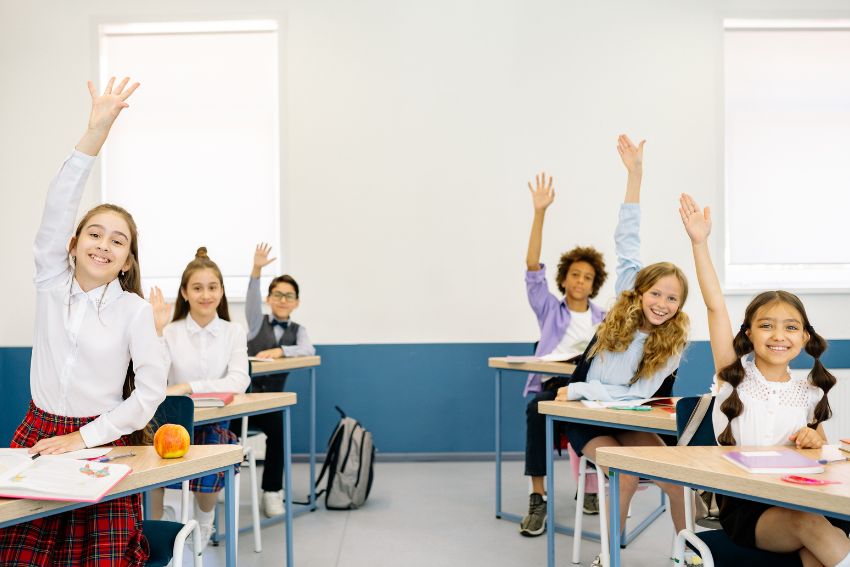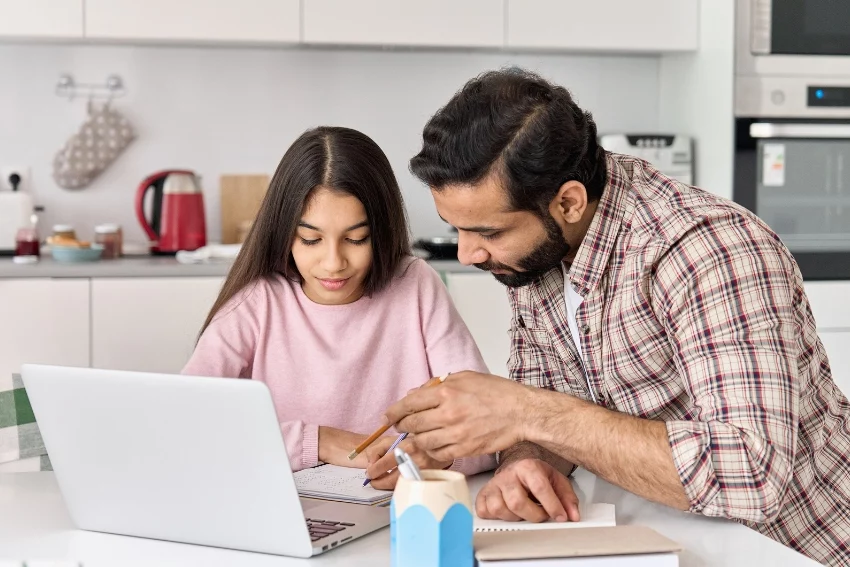Year 6 is the final chapter of your child’s primary school journey. It marks the end of Key Stage 2 and brings together everything they’ve learned over the years. This is a time when many children start showing more independence, maturity, and confidence in their learning.
It’s also a year of preparation. As they get ready to move on to secondary school, Year 6 helps them build the skills they’ll need for a smooth transition, both academically and emotionally. Alongside new challenges like SATs and secondary school applications, your child will also have plenty of opportunities to reflect on how far they’ve come.
In this blog, we’ll walk you through what to expect in Year 6, from the subjects your child will study, to SATs, to tips on supporting learning at home. Whether you’re looking ahead to the year or already in the middle of it, this guide is here to help you support your child every step of the way.
The Year 6 Curriculum: What Your Child Will Learn
In Year 6, your child will build on everything they’ve learned so far, with lessons that prepare them for secondary school and give them the confidence to work more independently. The curriculum covers a wide range of subjects, helping them grow academically, socially, and creatively.

Year 6 – English
Children will read and analyse a variety of texts, including fiction, non-fiction, and poetry. They’ll work on answering questions with evidence, exploring language choices, and understanding deeper meanings. In writing, there’s a focus on planning and creating longer pieces, like stories, reports, and persuasive texts. Grammar, punctuation, and spelling are also key, with regular practise to help children write with accuracy and clarity.
Year 6 – Maths
Year 6 maths includes both revision and new concepts. Children work on learning arithmetic skills like addition, subtraction, multiplication, and division. They’ll explore more complex areas too, such as fractions, percentages, algebra, and geometry. They’ll also learn how to interpret data in charts and graphs making links to real-life situations.
Year 6 – Science
In science, children continue learning about biology, physics, and chemistry topics. This includes areas like electricity, light, forces, and the human body. They’ll plan and carry out experiments, make observations, and record results using the scientific method. It’s all about developing curiosity and building confidence in investigating how things work.
Foundation Subjects
Year 6 also includes a wide range of foundation subjects: history, geography, art, music, computing, physical education (PE), and religious education (RE). These subjects help children develop creativity, cultural understanding, and physical health.
Altogether, the Year 6 curriculum aims to prepare children for what’s next, giving them a well-rounded education and the skills to thrive in secondary school.
Preparing for Key Stage 2 SATs
Towards the end of Year 6, your child will sit their Key Stage 2 SATs (Standard Assessment Tests). These are national assessments that check how well pupils have understood the key parts of the primary curriculum before moving on to secondary school. The results are shared with parents and secondary schools, but they don’t determine whether a child can move up a year. The SATs focus on three main areas:
- English Reading
- SPaG (Spelling, Punctuation, and Grammar)
- Mathematics
While SATs help schools measure progress, they’re also a useful way to highlight any areas where your child may need extra support. It’s important to remember that SATs are just one part of the bigger picture and don’t define your child’s overall ability or potential.
When Are Year 6 SATs in 2025?
The Year 6 SATs in 2025 are scheduled to take place from Monday 12th May to Thursday 15th May 2025. You may also want to know how grades work in year 6 SATs. Instead of letter grades or percentages, results are reported as scaled scores. A score of 100 means your child is working at the expected standard for their age. Anything above 100 shows they’re exceeding expectations, while a score below 100 suggests they might need some extra support.
Transitioning to Secondary School
One of the biggest parts of Year 6 is transitioning to secondary school. It’s a big step, and the more prepared your child feels, the smoother the transition will be.
Applications and admissions usually begin early in the autumn term. Most local councils set a deadline around late October, so it’s a good idea to start looking into schools as soon as Year 6 begins. You can apply online through your local authority’s website. Make sure to review the admission criteria for secondary schools as this can vary between schools and may influence your choices.
Visiting schools in person can really help both you and your child get a feel for each one. Open days and evenings are a great chance to meet teachers, ask questions, and see what each school offers. If possible, take your child with you, they’ll feel more involved in the decision.
Preparing your child emotionally and academically is just as important as choosing the right school. Talk about what secondary school will be like, answer any questions they have, and reassure them that it’s okay to feel nervous or excited or both. These small steps now can make a big difference when they start Year 7.

Year 6 – Resources for Parents
Supporting your child through Year 6 is much easier with the right resources. Whether you’re helping with homework, preparing for SATs, or encouraging reading at home, there are plenty of tools available to guide you.
Curriculum Support and Practice Materials
Websites like BBC Bitesize and Oak National Academy offer quizzes, and videos that follow the national curriculum. They’re great for reinforcing what your child is learning in school and for brushing up on trickier topics at home.
Learning Apps
Apps like Times Tables Rock Stars, Spelling Shed, and DoodleMaths can make learning feel more like play. They’re ideal for daily practise in short bursts and help keep revision fun and engaging.
Home Learning Tools
Simple tools like flashcards, spelling games, or maths puzzles can support learning in short, focused sessions. You can also create your own revision timetable or mini quizzes to build confidence ahead of SATs.
Local Support Options
If your child needs extra support, you can speak directly with their teacher or school SENCO (Special Educational Needs Coordinator). Local councils often list free or low-cost support services for families, including after-school clubs or homework help programmes.
Conclusion
As you already know year 6 is an important moment in your child’s education. It’s a time for consolidating learning, building confidence, and preparing for the big step to secondary school. With SATs, new responsibilities, and growing independence, this final year of primary school brings plenty of opportunities for growth.
As a parent, your involvement matters. Whether it’s helping with reading, practising times tables, or simply checking in after school, your support helps your child stay motivated and feel confident.
If they need extra support, online tutoring can be a flexible and a good option. With the right guidance, your child can focus on their weaker areas, boost their understanding, and feel more prepared for the months ahead.








